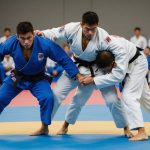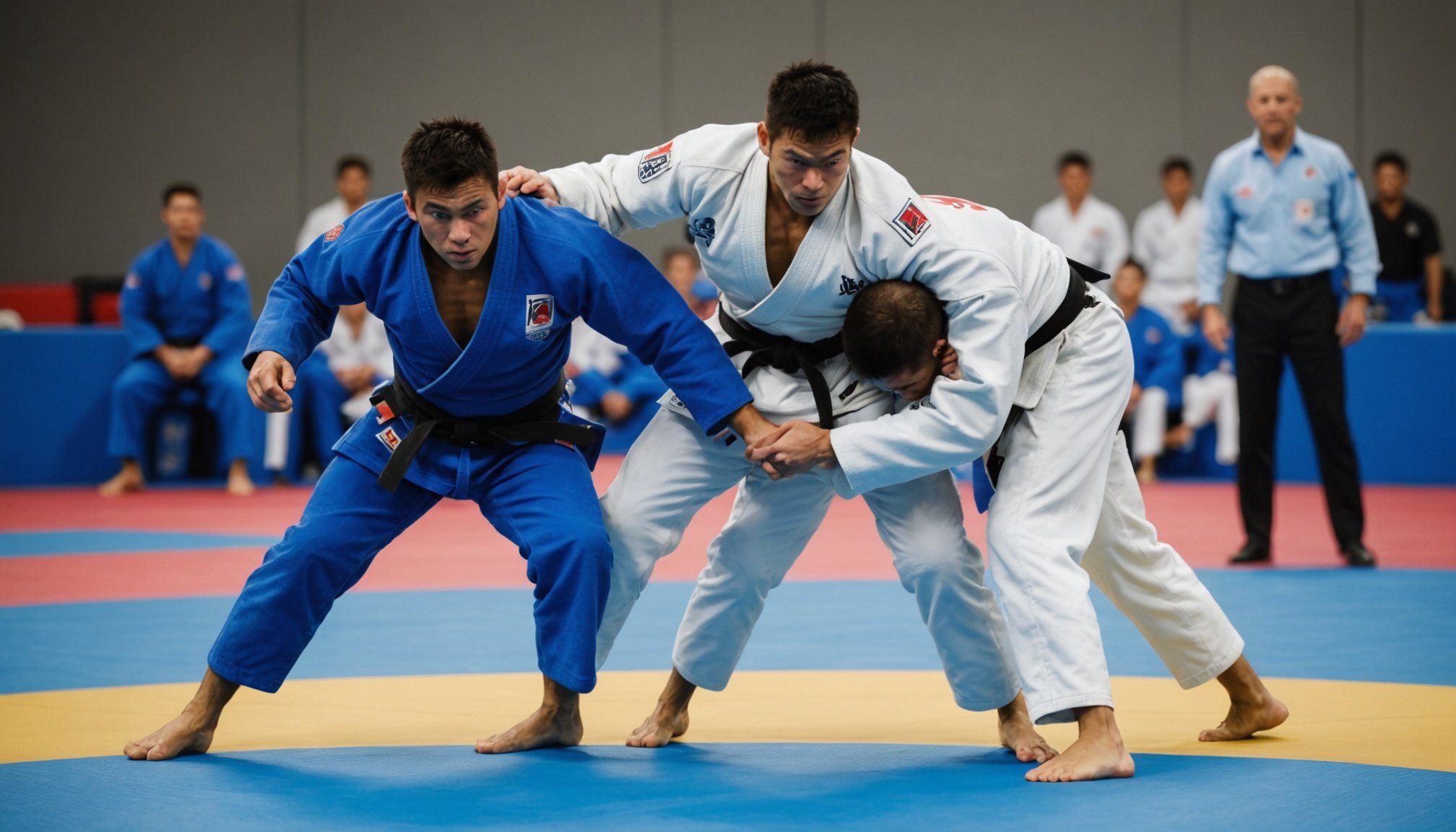Enhancing Mental Toughness: Key Psychological Strategies for Building Resilience in Professional Judo Athletes
Understanding Mental Toughness in Judo
Mental toughness is a critical component of success in judo, a combat sport that demands not only physical strength and technique but also psychological resilience. For judo athletes, mental toughness is the ability to perform at their best under pressure, to bounce back from setbacks, and to maintain focus and motivation over the long term.
In a study on mental toughness in elite performers, researchers highlighted that mental toughness involves a combination of psychological attributes, including confidence, focus, and resilience. These attributes are particularly crucial in combat sports like judo, where athletes face intense physical and mental challenges.
Also to discover : Top Warm-Up Routines to Elevate Your Competitive Dance Performance
The Role of Discipline and Routine in Mental Toughness
One of the foundational elements of building mental toughness is discipline and routine. Athletes who thrive in judo often adhere to a strict training regimen, which includes both physical and psychological training.
“Consistency leads to mastery, in both sports and life,” notes an article on the lessons learned from athletics. This consistency is built through daily routines that create structure and help athletes manage their time and responsibilities effectively.
Also read : Unlocking Mental Wellness: The Surprising Psychological Advantages of Consistent Kayaking
Here are some key takeaways on how discipline and routine contribute to mental toughness:
- Daily Training: Regular training sessions help athletes develop a sense of routine and discipline. This routine can include physical training, technical drills, and mental preparation.
- Nutrition and Recovery: A disciplined approach to nutrition and recovery is essential. Athletes must stick to a healthy diet and ensure they get adequate rest and recovery time to maintain their physical and mental health.
- Goal Setting: Setting clear, achievable goals is a part of the routine. Athletes break down their long-term goals into smaller, manageable steps, which helps maintain motivation and focus.
Psychological Techniques for Mental Toughness
Several psychological techniques are instrumental in enhancing mental toughness for judo athletes. Here are some of the most effective methods:
Visualization
Visualization involves creating a mental image of the desired outcome or the process to achieve it. This technique is widely used by elite athletes to foster a greater sense of self-belief and confidence.
“Visualization has been used effectively by many high-performing athletes across various sports, including combat sports like judo,” notes a study on mental toughness training. By visualizing success, athletes can prepare themselves mentally for the challenges they will face in competition.
Self-Talk
Self-talk involves using positive affirmations and statements to motivate oneself, boost confidence, and manage anxiety. In the high-pressure environment of judo, maintaining a positive mindset is crucial.
“Positive self-talk can be the difference between a win and a loss,” says a sports psychologist. Athletes who use positive self-talk are better equipped to handle stress and stay focused under pressure.
Goal Setting
Goal setting is a powerful tool for fostering mental toughness. By setting clear, realistic, and challenging goals, athletes can stay motivated and determined throughout their training and competitions.
“Successful goal-setting involves creating SMART goals; specific, measurable, achievable, relevant, and time-bound,” advises a study on goal setting. This approach helps athletes stay focused on their objectives and measure their progress effectively.
Mindfulness
Mindfulness involves being fully present in the moment, allowing athletes to manage their thoughts and emotions more effectively. This technique is particularly useful in reducing anxiety and improving performance.
“Mindfulness is a valuable tool for building mental toughness. It helps athletes manage their thoughts and emotions, leading to improved performance,” notes a study published on PubMed Crossref.
Managing Anxiety and Stress
Anxiety and stress are common challenges that judo athletes face, especially in the lead-up to competitions. Here are some strategies to manage these pressures:
Weight Regulation
For combat sports athletes, weight regulation is a significant challenge. Dramatic weight cuts can be both physically and mentally taxing.
“A healthy and sustainable weight management strategy is crucial for building mental toughness,” states a study in the International Journal of Sport Nutrition and Exercise Metabolism. Athletes who manage their weight effectively demonstrate higher levels of mental toughness.
Professional Psychology Support
Working with a sports psychologist can provide athletes with the tools and techniques needed to handle anxiety and stress.
“Athletes can benefit from professional psychological support to build resilience, maintain focus and confidence, and handle the pressures of competition,” advises a sports psychologist. This support can include mental toughness training, performance enhancement strategies, and techniques to deal with anxiety and stress.
Practical Advice for Judo Athletes
For judo athletes looking to enhance their mental toughness, here are some practical tips:
Focus on Technique Over Strength
One common mistake new judokas make is relying too heavily on strength rather than technique. This can lead to tension and stiffness, which are detrimental to performance.
“Focus on executing each of your throws at least once during randori. Mastery will require countless repetitions,” advises a judo practitioner on Reddit. It’s essential to be a supportive partner during training, maintaining a proper posture and being solid yet relaxed.
Use Tai Sabaki for Better Movement
Tai sabaki, or body movement, is a key concept in judo that helps athletes maintain balance and position.
“Think of tai sabaki as stepping around to maintain balance on a rocky boat ride rather than holding on to a handle or something for dear life while standing still,” explains a judo expert. This movement helps athletes stay upright and balanced, even when being pulled or pushed by their opponents.
Practice Ukemi
Ukemi, or the art of falling, is crucial for judokas. It helps them learn to relax and stay awake while being thrown.
“Taking the fall is very much good training too. You learn to relax and ‘stay awake’ while being hauled off balance and thrown,” notes a judo newbie on Reddit. Practicing ukemi helps athletes develop the resilience and adaptability needed in judo.
Table: Comparison of Psychological Techniques for Mental Toughness
| Technique | Description | Benefits |
|---|---|---|
| Visualization | Creating a mental image of the desired outcome or process. | Fosters self-belief and confidence. |
| Self-Talk | Using positive affirmations and statements to motivate oneself. | Boosts confidence, manages anxiety. |
| Goal Setting | Setting clear, realistic, and challenging goals. | Maintains motivation, focus, and determination. |
| Mindfulness | Being fully present in the moment to manage thoughts and emotions. | Reduces anxiety, improves performance. |
| Weight Regulation | Managing weight effectively to avoid dramatic cuts. | Demonstrates higher levels of mental toughness. |
| Professional Psychology Support | Working with a sports psychologist for mental training. | Provides tools to handle anxiety, stress, and build resilience. |
Building mental toughness is a multifaceted process that requires a combination of psychological techniques, discipline, and professional support. For judo athletes, mastering these elements is crucial for achieving success in the sport.
As one athlete noted, “Learning judo is akin to learning how to surf. The initial actions you take may not resemble surfing at all, but they are crucial for building a strong skill set that will enable you to become confident and at ease over time.”
By incorporating techniques like visualization, self-talk, goal setting, and mindfulness into their training, judo athletes can develop the mental resilience needed to excel in this demanding sport. Additionally, maintaining a disciplined routine, managing weight effectively, and seeking professional psychology support can further enhance their mental toughness.
In the words of a sports psychologist, “Mental toughness might be the invisible asset, but it’s the one that often decides the outcome in the challenging world of combat sports.”
By focusing on these key strategies, judo athletes can build the mental toughness necessary to perform at their best and achieve their goals in the sport.











